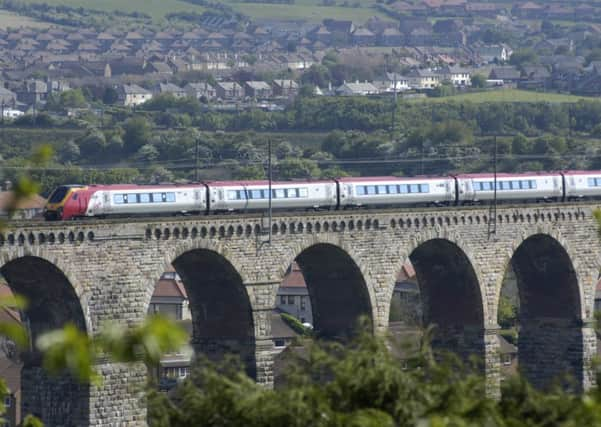‘Huge’ difference in train subsidies across UK


The Office of Rail Regulation (ORR) report also details the subsidy each train company receives from the public purse and just how much they pay back in premiums to the Treasury.
Opponents of plans to privatise the recently-nationalised East Coast service have claimed the report shows the flaws in the current franchise system.
Advertisement
Hide AdAdvertisement
Hide AdThe report showed that Government funding in 2012/13 varied from £2.19 per passenger journey in England to £7.60 in Scotland and £9.33 in Wales.
Total government funding for 2012/13 for the railways amounted to £4 billion which represented 30.9 per cent of the industry’s total income, and included £700,000 from Transport Scotland and £100,000 from the Welsh Government.
In line with UK government policy, passengers are covering an increased proportion of the rail industry’s income relative to taxpayers. Through fares paid, passengers accounted for 59.2 per cent of rail industry costs in 2012/13, compared with 57.4 per cent in 2011/12 and 55.6 per cent in 2010/11.
£7.7 billion spent on train fares
The ORR report, which covered the year from April 2012, found that total fare income was up 3.6 per cent annually, with £7.7 billion taken in fares. The cost of running Britain’s railways was £12.3 billion in 2012-13, staying consistent with costs of the previous three years.
The report also found that Virgin Trains paid almost six times more than taxpayer-owned East Coast in train leasing charges. Virgin paid £302 million in rolling stock charges for its fleet of trains, while East Coast paid £53 million while largely using much older trains.
ORR chief executive Richard Price said: “Britain’s rail industry receives substantial income from passengers and taxpayers. People have a right to know where the money goes and what it helps deliver.
“Passengers are increasingly the main funder of the railways, and must be central to developing its plans for the future. The ORR is working to put passengers at the heart of the railways.”
Shadow transport secretary Mary Creagh said: “Today’s report shows that the publicly owned East Coast company is highly efficient, returning more to taxpayers than it receives in funding.
Advertisement
Hide AdAdvertisement
Hide Ad“Yet David Cameron is obsessing about handing it back to the private sector. Passengers and taxpayers are picking up the tab for this out-of-touch Government’s franchising fiasco with higher fares and more public subsidy.
“The Government’s £40 million net contribution to train operating companies will skyrocket next year, as more franchise extensions mean worse value and higher contributions from taxpayers to train companies.”
‘Success story’
Michael Roberts, director general of industry body the Rail Delivery Group, said: “The ORR’s report shines a light on why Britain’s railway is such a big success story.
“An industry focused on attracting more passengers and freight, combined with a commitment by successive governments to invest over the long term, is generating phenomenal growth. This winning formula is helping to reduce unit costs while improving and expanding a vital public service.”
TUC general secretary and chairwoman of Action For Rail, Frances O’Grady, said: “Today’s figures show just how dependent rail firms have become on the public purse.
“Taxpayers’ money that should be spent on improving services is instead being siphoned off into shareholders’ pockets. Rail franchising is failing both passengers and taxpayers.
The Government’s determination to re-privatise the East Coast main line - even though it is delivering the biggest cash surplus of all - shows it has learnt nothing from past mistakes.”
Manuel Cortes, leader of the TSSA rail union, said: “The facts clearly support our argument that publicly owned franchises like East Coast offer a much better deal than privately run franchises like Virgin.
Advertisement
Hide AdAdvertisement
Hide Ad“The private railway has been a 20-year lesson in failure, paid for by both passengers and taxpayers.”
‘Scroungers’
Mick Cash, acting general secretary of the RMT union, said: “The corporate welfare on Britain’s railways continues unchecked with the scroungers from the private train companies fleecing the British people for mind-blowing sums of money.
“The case for bringing the whole rail network under public ownership, and ending the scandals of subsidy and revenue support, is absolutely overwhelming and it’s about time that the politicians of all parties took note.”
A Department for Transport spokesman said: “We recognise the positive impact the railways have on communities across the country.
“This is why we have embarked on one of the biggest programmes of modernisation ever, with more than £38 billion being spent to maintain and improve our network over the next five years.”
He went on: “Subsidy and premium differ across the UK, even at a regional level, because of variations in demand and costs, with some busier services requiring less Government support.
“Many services would not be commercially viable without taxpayer funding, and we subsidise them because they deliver wide social, environmental and economic benefits to their communities.”